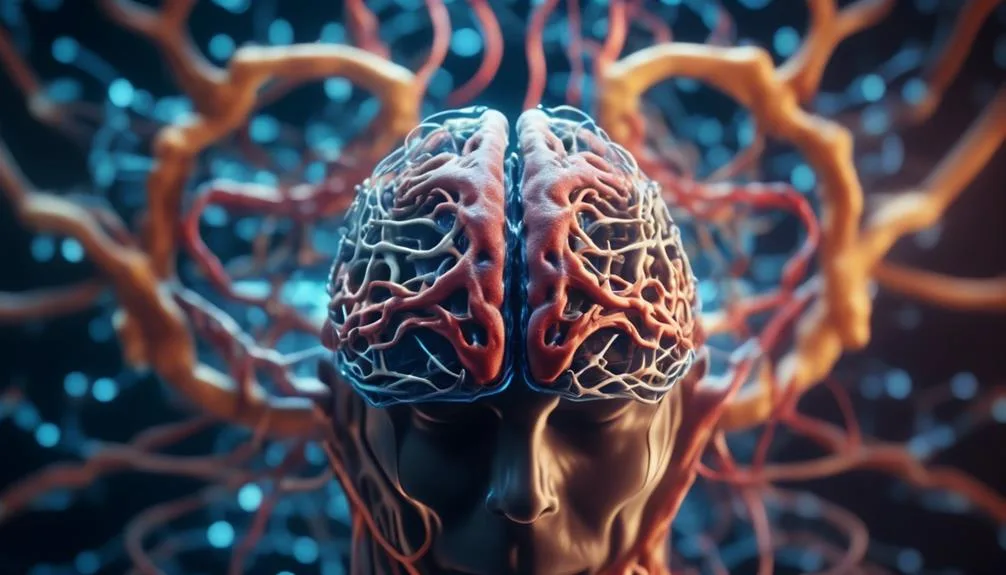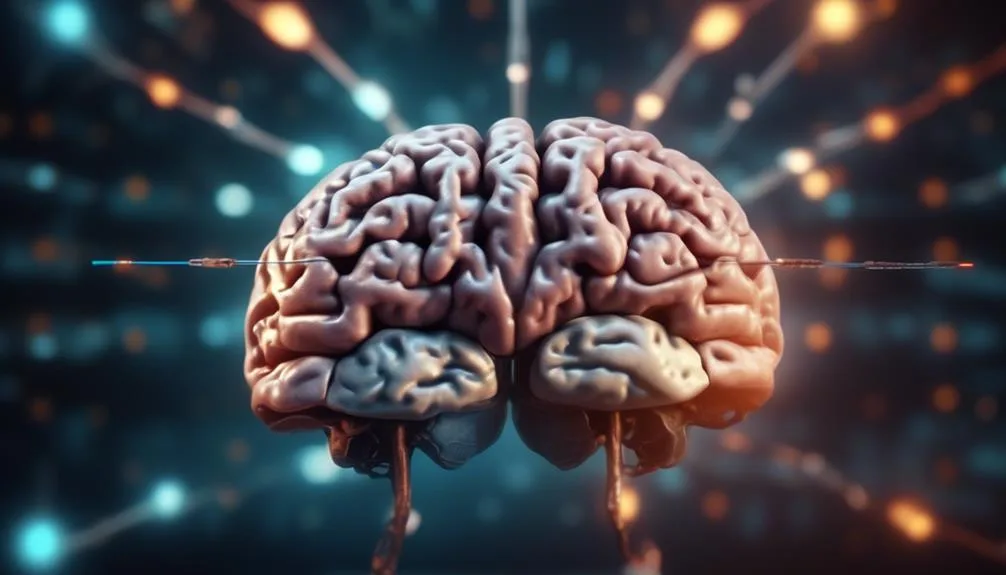Groundbreaking Theory Challenges Emotional Understanding: Cannon-Bard Revealed
Are you prepared to embark on a journey that will challenge your understanding of emotions?
Brace yourself as we unravel the enigmatic Cannon-Bard theory, a groundbreaking concept that defies the conventional wisdom surrounding the intricate realm of human emotions.
Developed by the brilliant minds of doctors Walter Cannon and Philip Bard, this theory dares to question the widely accepted James-Lange theory by proposing that emotions are not solely dependent on physiological responses.
Intriguing, isn't it? But this is just the tip of the iceberg.
There's so much more to discover about the experimental evidence, the role of the thalamus, and the key concepts and applications arising from this paradigm-shifting theory.
Are you willing to explore the depths of this revolutionary theory and challenge the very foundations of emotional understanding?
Key Takeaways
- Cannon-Bard Theory challenges the James-Lange theory of emotion by proposing that emotions and physiological changes occur simultaneously and independently.
- The thalamus plays a crucial role in the Cannon-Bard theory, as it relays sensory information to the cerebral cortex for cognitive processing and facilitates motor coordination.
- Emotions arise through cognitive appraisal of specific events, while physiological changes occur independently through the autonomic nervous system.
- The Cannon-Bard Theory emphasizes the separation of physiological responses and emotions, highlighting that psychological states and physiological responses are distinct entities.
Origin and Development of Cannon-Bard Theory
The Cannon-Bard theory, developed by doctors Walter Cannon and Philip Bard, emerged as one of the earliest theories of emotion, challenging the James-Lange theory and revolutionizing our understanding of the relationship between physiological responses and emotional experiences.
This theory holds great significance in the field of emotional research, as it paved the way for a new perspective on how emotions are generated. The impact of the Cannon-Bard theory on emotional research can't be overstated. It proposed that emotions aren't solely reliant on physiological behaviors, contradicting the James-Lange theory.
Through scientific experiments on animals and human anatomy, Cannon and Bard demonstrated that emotions can occur independently of physiological changes. Their findings challenged the prevailing belief that emotions were solely dependent on physical symptoms.
This groundbreaking theory opened up new avenues for studying and understanding the complex nature of emotions and their underlying mechanisms.
Experimental Evidence Disrupting Traditional Views

Emerging from their groundbreaking research, Cannon and Bard's experiments provided compelling evidence that disrupted traditional views on the relationship between physiological responses and emotions. Their findings had a significant impact on psychology and revealed implications for therapy.
By conducting experiments on animals and observing human anatomy, Cannon and Bard challenged the prevailing James-Lange theory, which proposed that physiological changes precede the cognitive experience of emotions. Contrary to this, their experiments demonstrated that emotions can occur independently of physiological changes.
This discovery revolutionized the understanding of emotions and highlighted the importance of cognitive appraisal in the experience of emotions. The implications for therapy are profound, as therapists can now focus on helping individuals develop healthier cognitive appraisals to manage and regulate their emotions.
Cannon and Bard's experiments have undoubtedly transformed the field of psychology and continue to shape therapeutic interventions.
The Role of the Thalamus in Emotional Processing

The thalamus plays a crucial role in the processing of emotions, acting as a pivotal brain structure in the Cannon-Bard theory. Its function is to relay sensory information to the cerebral cortex for processing, which leads to the cognitive experience of emotion.
In addition to its involvement in emotional processing, the thalamus also facilitates motor coordination through connections with the cerebellum and basal ganglia. Studies have shown that damage to the thalamus can result in emotional disturbances, further supporting its role in emotional experience.
The thalamus acts as a gateway, receiving and transmitting sensory information that contributes to the formation of emotions. Understanding the function of the thalamus is essential in comprehending the complex processes involved in emotional processing.
Key Concepts and Applications of Cannon-Bard Theory

In the Cannon-Bard Theory, emotions are understood to arise through the simultaneous and independent occurrence of cognitive appraisal and physiological changes. Unlike the James-Lange Theory, which suggests that physiological changes precede the cognitive experience of emotions, the Cannon-Bard Theory proposes that these two processes occur simultaneously.
Cognitive appraisal refers to the evaluation and interpretation of a specific event, which triggers an emotional response. Meanwhile, physiological responses occur independently through the autonomic nervous system, resulting in physical changes in the body.
This theory emphasizes the parallel activation of cognitive and physiological processes during emotional experiences. It also highlights the importance of cognitive assessment in the experience of emotions and recognizes the separation of physiological responses and emotional states.
The Cannon-Bard Theory provides valuable insights into the complex nature of emotions, contributing to our understanding of the fight-or-flight response and the key elements of emotions.
Criticisms and Alternative Perspectives of the Theory

One common criticism of the Cannon-Bard Theory is that it oversimplifies the complex relationship between physiological responses and emotions. This theory proposes that emotions and physiological changes occur simultaneously and independently. However, there are alternative perspectives and criticisms that suggest a more intricate connection between these factors.
Here are some key points to consider:
- Complex relationship: The relationship between physiological responses and emotions is multifaceted, involving various biological, psychological, and social influences.
- Physiological influences: Evidence suggests that physiological responses can influence emotions, indicating that the relationship isn't one-sided.
- Oversimplification: Critics argue that the Cannon-Bard Theory fails to fully capture the intricate interplay between physiological processes and emotional experiences.
- Contextual factors: Alternative perspectives highlight the importance of situational and contextual factors in shaping emotional responses.
- Individual differences: The theory may not account for the individual variability in how physiological responses and emotions are interconnected.
In order to gain a comprehensive understanding of emotions, it's essential to consider the complex relationship and the diverse influences of physiological processes on emotional experiences.
Frequently Asked Questions
How Does the Cannon-Bard Theory Challenge the James-Lange Theory of Emotion?
The Cannon-Bard theory challenges the James-Lange theory by proposing that cognitive appraisal and physiological changes occur simultaneously and independently during emotional experiences. This implies that emotions can arise without accompanying physiological changes, which contradicts the James-Lange theory.
What Are the Key Differences Between the James-Lange Theory and the Cannon-Bard Theory?
The key differences between the James-Lange theory and the Cannon-Bard theory lie in their understanding of emotional processes. While James-Lange suggests that physiological changes precede emotions, Cannon-Bard proposes simultaneous and independent cognitive appraisal and physiological changes.
How Does the Thalamus Play a Role in Emotional Processing According to the Cannon-Bard Theory?
The thalamus plays a crucial role in emotional processing according to the Cannon-Bard theory. It relays sensory information to the cerebral cortex, facilitating cognitive appraisal and the experience of emotions.
What Is the Significance of Cognitive Appraisal in the Cannon-Bard Theory?
In the Cannon-Bard theory, cognitive appraisal holds significant importance. It suggests that emotions arise through the cognitive assessment of specific events, independent of physiological changes. This challenges traditional notions of emotional understanding.
What Are Some Criticisms of the Cannon-Bard Theory and Alternative Perspectives on the Relationship Between Physiology and Emotions?
The Cannon-Bard theory, while groundbreaking, has faced critiques. Alternative perspectives suggest a more complex relationship between physiology and emotions, with evidence showing physiological responses can influence emotions.
Conclusion
Congratulations! You have successfully delved into the captivating world of the Cannon-Bard theory, challenging our understanding of emotions.
By exploring the groundbreaking findings of doctors Cannon and Bard, we've shattered the traditional views and discovered that emotions aren't solely dependent on physiological changes.
The thalamus plays a crucial role in emotional processing, shedding light on the complexities of human experience.
With its empirical evidence and insightful applications, the Cannon-Bard theory invites us to embrace a new perspective on the intricate nature of emotions.






